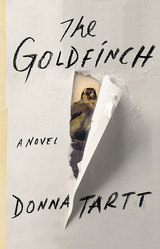
Growing up in New York City with his mother and an absent father, everything changes for Theo when the museum that he's visiting with his mother explodes, killing her. In the aftermath, amongst the wreckage, he finds himself comforting an old man, who, in his delirium, asks him to put a painting, The Goldfinch, in a carrier bag, he also gives him a ring, and an address to take it to. Theo leaves the museum with The Goldfinch, the object which is to haunt him for...well, the rest of the novel.
As the novel progresses it weaves the narrative of the current events with retrospective information; a technique which brings Theo to life as a character - a capricious, thoughtless, struggling, emotionally incapacitated character. I began to realise that not everything about Theo, or the people surrounding him, is being made clear; in fact, you might have to wait 500 pages before finding out how he really felt about anything. But this is the nature of memoir, of writing and re-writing history.
At one point, Theo talks with Pippa, a fellow survivor, about survivor's guilt. The nagging feeling the rest of their lives that they should have known, should have been able to stop it, that the deaths of their loved ones were all their fault.
| I've read reviews of The Goldfinch that say they couldn't relate to Theo as a person, they found the novel a push to read as they didn't care much what happened to him. | I understand the feeling which seems to steer Theo's decisions, the feeling of being totally lost in your own life |
The whole novel is a testament to his guilt as a survivor, where The Goldfinch is a place to escape from his unresolved emotions, at the same time as being a visceral reminder of that terrible day. While he has the painting, he knows he has to return it but he can't let go of the event, and the loss.
The Goldfinch is a slowly unfolding study of human emotions, and a tale of redemption, set against the immersive backdrop of New York City (where it always seems to be raining in this book), the bright and bleak Las Vegas, and maze-like Amsterdam – where the action finally picks up for the headlong rush to the slightly bloody denouement.
Personally, I would have preferred a less 'tidy' ending, but unfortunately, as in real life, we can't always get what we want.
Amelia reads on the train, in between hunting for cupcake cafes and talking about social media, on social media.


 RSS Feed
RSS Feed
